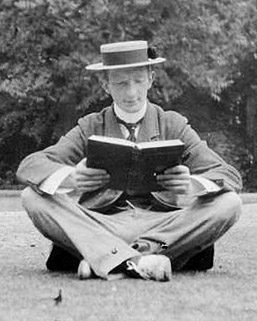|
Clause Four
Clause IV is part of the Labour Party Rule Book, which sets out the aims and values of the (UK) Labour Party. The original clause, adopted in 1918, called for common ownership of industry, and proved controversial in later years; Hugh Gaitskell attempted to remove the clause following Labour's loss in the 1959 general election. In 1995, under the leadership of Tony Blair, a new Clause IV was adopted. This was seen as a significant moment in Blair's redefinition of the party as New Labour, but has survived beyond the New Labour branding. Text The original version of Clause IV was drafted by Sidney and Beatrice Webb in November 1917, and adopted by the party in 1918. It read, in part 4: This section was widely seen as the Labour Party's commitment to socialism, even though the word "socialism" is not explicitly mentioned. ''The Manchester Guardian'' heralded it as showing "the Birth of a Socialist Party", stating that: In 1918, nationalisation was seen by many voters as aki ... [...More Info...] [...Related Items...] OR: [Wikipedia] [Google] [Baidu] |
Labour Party Rule Book
Labour or labor may refer to: * Childbirth, the delivery of a baby * Labour (human activity), or work ** Manual labour, physical work ** Wage labour, a socioeconomic relationship between a worker and an employer ** Organized labour and the labour movement, consisting principally of labour unions ** The Labour Party (UK) Literature * ''Labor'' (journal), an American quarterly on the history of the labor movement * ''Labour/Le Travail'', an academic journal focusing on the Canadian labour movement * ''Labor'' (Tolstoy book) or ''The Triumph of the Farmer or Industry and Parasitism'' (1888) Places * La Labor, Honduras * Labor, Koper, Slovenia Other uses * ''Labor'' (album), a 2013 album by MEN * Labor (area), a Spanish customary unit * "Labor", an episode of TV series '' Superstore'' * Labour (constituency), a functional constituency in Hong Kong elections * Labors, fictional robots in ''Patlabor'' People with the surname * Earle Labor (born 1928), professor of American liter ... [...More Info...] [...Related Items...] OR: [Wikipedia] [Google] [Baidu] |
Nationalization
Nationalization (nationalisation in British English) is the process of transforming privately-owned assets into public assets by bringing them under the public ownership of a national government or state. Nationalization usually refers to private assets or to assets owned by lower levels of government (such as municipalities) being transferred to the state. Nationalization contrasts with privatization and with demutualization. When previously nationalized assets are privatized and subsequently returned to public ownership at a later stage, they are said to have undergone renationalization. Industries often subject to nationalization include the commanding heights of the economy – telecommunications, electric power, fossil fuels, railways, airlines, iron ore, media, postal services, banks, and water – though, in many jurisdictions, many such entities have no history of private ownership. Nationalization may occur with or without financial compensation to the former owners. ... [...More Info...] [...Related Items...] OR: [Wikipedia] [Google] [Baidu] |
Left-wing Politics
Left-wing politics describes the range of Ideology#Political%20ideologies, political ideologies that support and seek to achieve social equality and egalitarianism, often in opposition to social hierarchy. Left-wing politics typically involve a concern for those in society whom its adherents perceive as disadvantaged relative to others as well as a belief that there are unjustified inequalities that need to be reduced or abolished. Left-wing politics are also associated with popular or state control of major political and economic institutions. According to emeritus professor of economics Barry Clark, left-wing supporters "claim that human development flourishes when individuals engage in cooperative, mutually respectful relations that can thrive only when excessive differences in status, power, and wealth are eliminated." Within the left–right political spectrum, ''Left'' and ''right-wing politics, Right'' were coined during the French Revolution, referring to the seat ... [...More Info...] [...Related Items...] OR: [Wikipedia] [Google] [Baidu] |
Oxford University Press
Oxford University Press (OUP) is the university press of the University of Oxford. It is the largest university press in the world, and its printing history dates back to the 1480s. Having been officially granted the legal right to print books by decree in 1586, it is the second oldest university press after Cambridge University Press. It is a department of the University of Oxford and is governed by a group of 15 academics known as the Delegates of the Press, who are appointed by the vice-chancellor of the University of Oxford. The Delegates of the Press are led by the Secretary to the Delegates, who serves as OUP's chief executive and as its major representative on other university bodies. Oxford University Press has had a similar governance structure since the 17th century. The press is located on Walton Street, Oxford, opposite Somerville College, in the inner suburb of Jericho. For the last 500 years, OUP has primarily focused on the publication of pedagogical texts and ... [...More Info...] [...Related Items...] OR: [Wikipedia] [Google] [Baidu] |
National Health Service
The National Health Service (NHS) is the umbrella term for the publicly funded healthcare systems of the United Kingdom (UK). Since 1948, they have been funded out of general taxation. There are three systems which are referred to using the "NHS" name ( NHS England, NHS Scotland and NHS Wales). Health and Social Care in Northern Ireland was created separately and is often locally referred to as "the NHS". The four systems were established in 1948 as part of major social reforms following the Second World War. The founding principles were that services should be comprehensive, universal and free at the point of delivery—a health service based on clinical need, not ability to pay. Each service provides a comprehensive range of health services, free at the point of use for people ordinarily resident in the United Kingdom apart from dental treatment and optical care. In England, NHS patients have to pay prescription charges; some, such as those aged over 60 and certain state ben ... [...More Info...] [...Related Items...] OR: [Wikipedia] [Google] [Baidu] |
National Coal Board
The National Coal Board (NCB) was the statutory corporation created to run the nationalised coal mining industry in the United Kingdom. Set up under the Coal Industry Nationalisation Act 1946, it took over the United Kingdom's collieries on "vesting day", 1 January 1947. In 1987, the NCB was renamed the British Coal Corporation, and its assets were subsequently privatised. Background Collieries were taken under government control during the First and Second World Wars. The Sankey Commission in 1919 gave R. H. Tawney, Sidney Webb and Sir Leo Chiozza Money the opportunity to advocate nationalisation, but it was rejected. Coal reserves were nationalised during the war in 1942 and placed under the control of the Coal Commission, but the mining industry remained in private hands. At the time, many coal companies were small, although some consolidation had taken place in the years before the war. Formation and organisation The NCB was one of a number of public corporations cr ... [...More Info...] [...Related Items...] OR: [Wikipedia] [Google] [Baidu] |
Bank Of England
The Bank of England is the central bank of the United Kingdom and the model on which most modern central banks have been based. Established in 1694 to act as the English Government's banker, and still one of the bankers for the Government of the United Kingdom, it is the world's eighth-oldest bank. It was privately owned by stockholders from its foundation in 1694 until it was nationalised in 1946 by the Attlee ministry. The Bank became an independent public organisation in 1998, wholly owned by the Treasury Solicitor on behalf of the government, with a mandate to support the economic policies of the government of the day, but independence in maintaining price stability. The Bank is one of eight banks authorised to issue banknotes in the United Kingdom, has a monopoly on the issue of banknotes in England and Wales, and regulates the issue of banknotes by commercial banks in Scotland and Northern Ireland. The Bank's Monetary Policy Committee has devolved responsibility for ... [...More Info...] [...Related Items...] OR: [Wikipedia] [Google] [Baidu] |
Herbert Morrison
Herbert Stanley Morrison, Baron Morrison of Lambeth, (3 January 1888 – 6 March 1965) was a British politician who held a variety of senior positions in the UK Cabinet as member of the Labour Party. During the inter-war period, he was Minister of Transport during the Second MacDonald ministry, then after losing his parliamentary seat in the 1931 United Kingdom general election, he became Leader of the London County Council in the 1930s. After returning to the Commons, he was defeated by Clement Attlee in the 1935 Labour Party leadership election but later acted as Home Secretary in the wartime coalition. Morrison organised Labour's victorious 1945 election campaign, and was appointed Leader of the House of Commons and acted as Attlee's deputy in the Attlee ministry of 1945–51. Attlee, Morrison, Ernest Bevin, Stafford Cripps, and initially Hugh Dalton formed the "Big Five" who dominated those governments. Morrison oversaw Labour's nationalisation programme, although he op ... [...More Info...] [...Related Items...] OR: [Wikipedia] [Google] [Baidu] |
Clement Attlee
Clement Richard Attlee, 1st Earl Attlee, (3 January 18838 October 1967) was a British politician who served as Prime Minister of the United Kingdom from 1945 to 1951 and Leader of the Labour Party from 1935 to 1955. He was Deputy Prime Minister during the wartime coalition government under Winston Churchill, and served twice as Leader of the Opposition from 1935 to 1940 and from 1951 to 1955. Attlee remains the longest serving Labour leader. Attlee was born into an upper-middle-class family, the son of a wealthy London solicitor. After attending the public school Haileybury College and the University of Oxford, he practised as a barrister. The volunteer work he carried out in London's East End exposed him to poverty, and his political views shifted leftwards thereafter. He joined the Independent Labour Party, gave up his legal career, and began lecturing at the London School of Economics. His work was interrupted by service as an officer in the First World War. In 1919, he ... [...More Info...] [...Related Items...] OR: [Wikipedia] [Google] [Baidu] |
Beveridge Report
The Beveridge Report, officially entitled ''Social Insurance and Allied Services'' ( Cmd. 6404), is a government report, published in November 1942, influential in the founding of the welfare state in the United Kingdom. It was drafted by the Liberal economist William Beveridge – with research and publicity by his wife, mathematician Janet Beveridge – who proposed widespread reforms to the system of social welfare to address what he identified as "five giants on the road of reconstruction": "Want… Disease, Ignorance, Squalor and Idleness". Published in the midst of World War II, the report promised rewards for everyone's sacrifices. Overwhelmingly popular with the public, it formed the basis for the post-war reforms known as the welfare state, which include the expansion of National Insurance and the creation of the National Health Service. Background In 1940, during the Second World War, the Labour Party entered into a coalition with the Conservative Party. On 10 June 194 ... [...More Info...] [...Related Items...] OR: [Wikipedia] [Google] [Baidu] |
William Beveridge
William Henry Beveridge, 1st Baron Beveridge, (5 March 1879 – 16 March 1963) was a British economist and Liberal politician who was a progressive and social reformer who played a central role in designing the British welfare state. His 1942 report ''Social Insurance and Allied Services'' (known as the Beveridge Report) served as the basis for the welfare state put in place by the Labour government elected in 1945. He built his career as an expert on unemployment insurance. He served on the Board of Trade as Director of the newly created labour exchanges, and later as Permanent Secretary of the Ministry of Food. He was Director of the London School of Economics and Political Science from 1919 until 1937, when he was elected Master of University College, Oxford. Beveridge published widely on unemployment and social security, his most notable works being: ''Unemployment: A Problem of Industry'' (1909), ''Planning Under Socialism'' (1936), ''Full Employment in a Free Societ ... [...More Info...] [...Related Items...] OR: [Wikipedia] [Google] [Baidu] |
Consumers' Co-operative
A consumers' co-operative is an enterprise owned by consumers and managed democratically and that aims at fulfilling the needs and aspirations of its members. Such co-operatives operate within the market system, independently of the state, as a form of mutual aid, oriented toward service rather than pecuniary profit. Consumers' cooperatives often take the form of retail outlets owned and operated by their consumers, such as food co-ops. However, there are many types of consumers' cooperatives, operating in areas such as health care, insurance, housing, utilities and personal finance (including credit unions). In some countries, consumers' cooperatives are known as cooperative retail societies or retail co-ops, though they should not be confused with retailers' cooperatives, whose members are retailers rather than consumers. Consumers' cooperatives may, in turn, form cooperative federations. These may come in the form of cooperative wholesale societies, through which consumers' ... [...More Info...] [...Related Items...] OR: [Wikipedia] [Google] [Baidu] |


.jpg)




.png)

